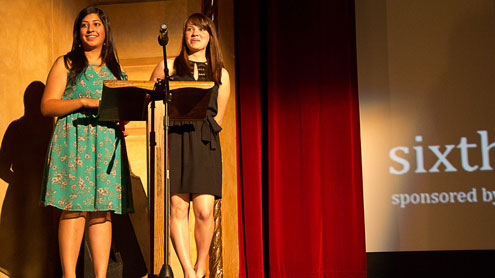The 6th Annual Documenting Justice Film Screening sponsored by the department of telecommunications and film and the Center for Ethics and Social Responsibility at the University of Alabama screened seven student documentaries last night at the Bama Theatre.
Each film, produced by a pair of students, shined a light on local tales of history and adversity, from presenting the effects of the modern state of farming and mental health care to the impact of Alabama’s HB56 immigration law and the devastating April 27tornadoes.
Senior and public relations major Mischa Lewis and her partner Jamie Woodham screened their documentary, “State of Confusion,” on 33-year-old Bryce Johnson. After spending 14 years in prison convicted for complicity in a murder and a brief escape, Woodham worked through a prison arts program in Montgomery. Upon his release, he put to use his developed artistic skills reciting heartfelt poetry and working as a filmmaker at Fast Forward Studios, despite his criminal past.
Lewis, who found interest in the program after spying a poster on campus, said the development of her and her classmates’ films were not as straightforward as they may seem.
Initially intending to examine the inside of the prison arts program, their access was restricted. The pair decided to instead interview three former convicts, but Lewis said it quickly became apparent that Woodham’s story was too inspirational to not become their focus.
“I felt like getting to know Bryce destroyed so many stereotypes,” Lewis said. “It opened my eyes, and I wanted to open the audience’s eyes as well.”
By the time of the screening, Lewis said she had edited the film to the point of sickness and was struck by nerves until she saw the audience react in thoughtful silence, laughter and audible joy.
According to Lewis, her experience expanded her consciousness, but also provided her with film-related tools she believed to applicable to her future in public relations. She said students of the program could find applications across a variety of fields and suggested that some now consider a possible future in the film industry.
UA English instructor Brian Oliu has attended documenting justice screenings all six years and said he’s seen an quick progression in the program producing an impressive baseline of quality.
He said Mary Sellers Shaw and Carlos Estrada’s “Undocumented” film focused on the lives of two illegal immigrants as the 2012 film appealed to him the most.
“It wasn’t heavy handed and it really told the story of these people,” Oliu said.
In attendance with Oliu, UA graduate student Abbas Abidi came unsure of what to expect from the student productions.
“It just exceeded all my expectations,” Abidi said. “They were polished and truly impressive films.”
Started by Stephen Black, director of the CESR, as a way to strengthen relationships between students and their surrounding communities, the documenting justice program began at UA in 2006.
According to Andrew Grace, the current director of the programing, the classes bring in non-film major students who often have little-to-no experience in documentary filmmaking and produce a seven to nine minute films on a story of justice or injustice in Alabama.
Grace said by the end of his first full year, he had solidified the class’s unique model — teaching film theory, documentary history and the ethics of the form in its first semester, and becoming what he called a series of “impromptu production meetings” to create their films during the second semester.
“It’s a learning experience till the very end,” Grace said. “If these students could go back right now, these films would be even more impressive.”
He said this process has been tweaked slightly since 2006, but it has retained its thought-provoking nature as the core premise of the program.
“Empathy is the most important thing people take from this course,” Grace said. “They demonstrate a real sensitivity to listening to people. Students are forced to think about the world from a different perspective.”









